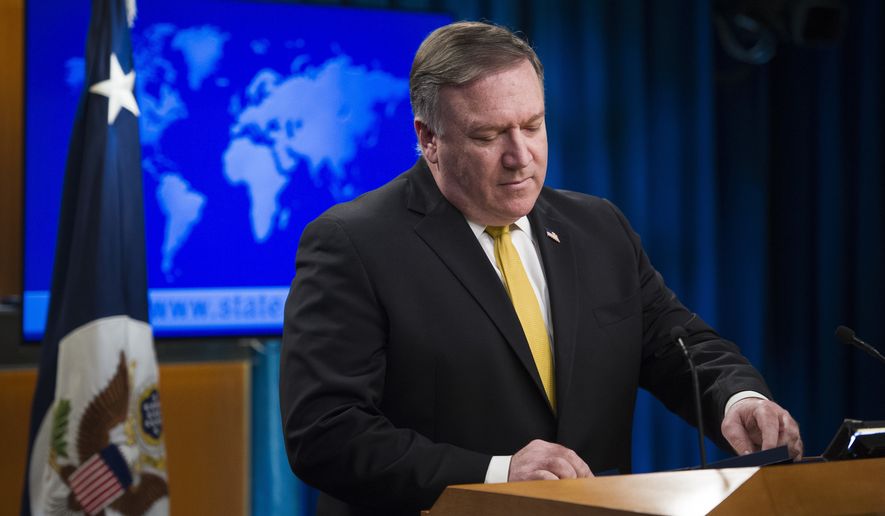A Trump administration plan to organize friendly Middle East regimes into an “Arab NATO” is gathering unexpected steam, with the State Department on Wednesday confirming that Saudi Arabia and eight other allies plan a meeting soon to start putting the idea into practice.
During much of September, Deputy Assistant Secretary of State for Arabian Gulf Affairs Tim Lenderking engaged in shuttle diplomacy to lay the groundwork for a U.S.-hosted summit in January on what officials are calling the “Middle East Strategic Alliance,” or MESA.
Those efforts appeared to pay off late last week, when Secretary of State Mike Pompeo gathered on the sidelines of the U.N. General Assembly in New York City with the foreign ministers of Bahrain, Egypt, Jordan, Kuwait, Oman, Qatar, Saudi Arabia, and the United Arab Emirates to prepare for the January meeting, State Department sources confirmed.
U.S. officials called Mr. Pompeo’s Gulf Cooperation Council “GCC+2 Ministerial” meeting “productive” with State Department spokeswoman Heather Nauert adding that last Friday’s talks focused “on establishing a MESA, anchored by a united GCC, to advance prosperity, security, and stability in the region.”
Details of the proposed MESA summit were first published in the Abu Dhabi-based newspaper The National late last month.
Timelines for holding an Arab NATO summit have been fluid, with reports last summer suggesting October as a possibility.
On Wednesday, a senior U.S. official cautioned that while negotiations remained in their early stages and that firm dates were flexible, the U.S. government “would like to agree on the concept of MESA by the January summit.”
The developing Arab NATO/MESA military coalition would be a Saudi-led effort and would include the six Arab states of the Gulf Cooperation Council (GCC) along with Egypt and Jordan.
If successful, the coalition would be seen across the region as a major payoff of Mr. Trump’s policy of cultivating Arab states since virtually the beginning of his presidency to advance U.S. interests in the region. An Arab NATO, the thinking goes, would present a united front in confronting Iran, defeating the Islamic State and other terrorist groups, bringing peace and stability to Syria and Yemen and bolstering Iraq.
A National Security Council official recently told The Washington Times that the alliance is an administration priority because it will “help reduce the financial burden the United States bears and build partner capacity in the Middle East.”
The Arab NATO concept, however, has been deeply hampered by a bitter diplomatic feud among America’s Gulf allies, with a Saudi-led coalition seeking to blackball Qatar over charges that Doha has supported terrorists and was too close to Tehran.
Qatar has repeatedly rejected the accusations, and both sides have launched robust lobbying campaigns trying to sway the Trump administration to their side.
Ahmad Majidyar, head of the Washington-based Middle East Institute’s IranObserved project, has said if the diplomatic crisis can be solved, MESA could mark a major step in “pushing back on Iran’s expansion and ambitions.”
Mr. Lenderking hinted in an interview with The National last week that progress had been made on the proposed Arab alliance, with defense meetings resuming within the GCC with Qatar present.
“We can continue to develop the [MESA] concept and work on some of the pillars,” Mr. Lenderking said, acknowledging the need to “de-escalate” the internal crisis over Qatar if the alliance is to thrive.
“In the long term, with the Mesa that we envision, it would be hard to have two or three countries in this alliance in this kind of confrontation,” he said.
Security analysts say an Arab NATO could develop into a strong military partnership that coordinates missile defenses, military training and counter-terrorism measures. The combination could also buttress security along strategic Gulf shipping lanes that carry much of the world’s oil supply.
But past efforts at security alliance in the region have repeatedly foundered, including the U.S.-led Baghdad Pact of the 1950s, which morphed into the Central Treaty Organization (CENTO).
Iran has also belittled the idea, arguing that history has shown that its regional adversaries cannot come together in any coherent way.
• Dan Boylan can be reached at dboylan@washingtontimes.com.




Please read our comment policy before commenting.